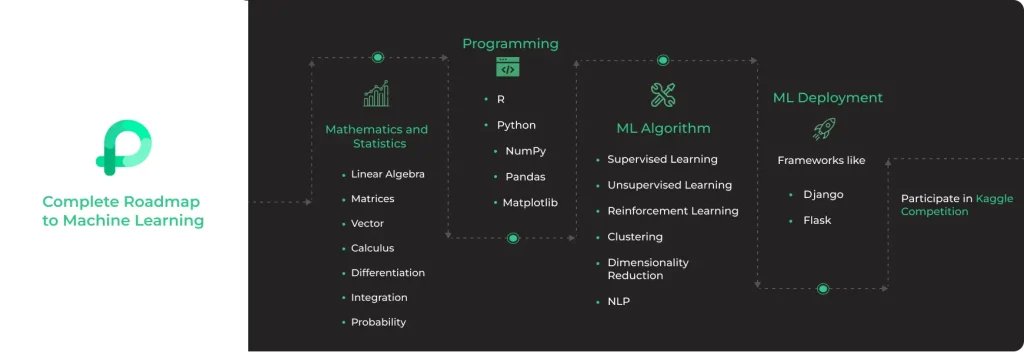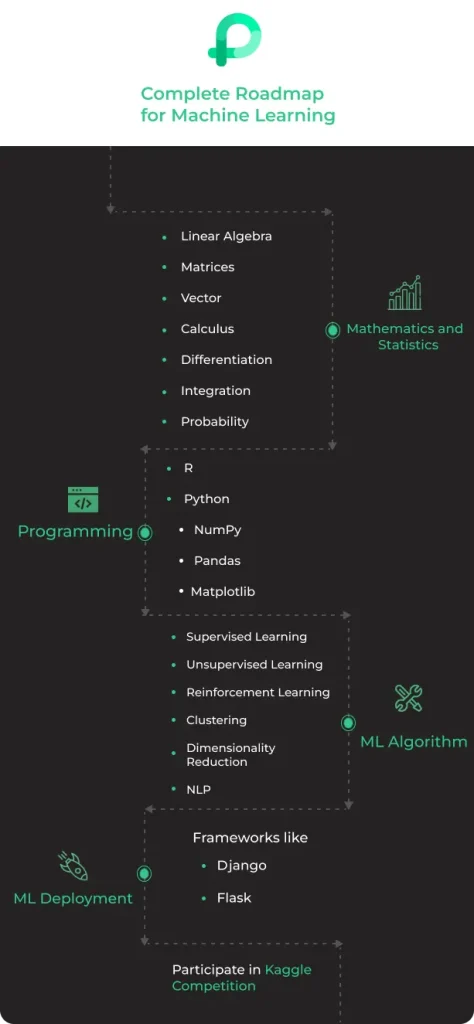Complete Machine Learning Roadmap
How to become a Machine Learning Engineer
Here you will find in detail the complete Machine Learning Roadmap. It is a subfield of artificial intelligence (AI) that focuses mainly on developing algorithms and models that is capable of learning from data and making predictions or decisions without being explicitly programmed.
Table of Content :
- What is Machine Learning?
- Its Types
- Complete Machine Learning Roadmap

What is Machine Learning?
Machine learning enables computers to learn and improve from experience or examples. It has a wide range of applications, including image and speech recognition, natural language processing, recommendation systems, predictive analytics, anomaly detection, and many others. It continues to advance with the development of more sophisticated algorithms, increased computing power, and the availability of large datasets.
Types of Machine Learning
There are total three types of Machine Learning
- Supervised Learning
- Unsupervised Learning
- Reinforcement Learning
Roadmap to being an expert in Machine Learning


The Best Roadmap to be Expert in ML in 7 Steps!!
1. Mathematics and Statistics:
- Linear algebra: Matrices, vectors, and operations.
- Calculus: Differentiation, integration, and optimization.
- Probability theory and statistics: Distributions, random variables, hypothesis testing, and regression.
2. Programming :
- Python: Learn the fundamentals of Python programming language and its libraries such as NumPy, Pandas, and Matplotlib, and also the programming language R.
- Version control: Git and GitHub for code management.
- Object-oriented programming (OOP) principles and design patterns.
- Software development practices: Testing, debugging, and code documentation.
3. Foundations of Machine Learning:
- Supervised learning: Linear regression, logistic regression, decision trees, random forests, and support vector machines (SVM).
- Unsupervised learning: Clustering algorithms (k-means, hierarchical clustering) and dimensionality reduction techniques (principal component analysis).
Evaluation metrics: Accuracy, precision, recall, F1-score, and confusion matrix.
4. Deep Learning:
- Neural networks: Basics of feedforward neural networks and backpropagation algorithm.
- Deep learning frameworks: TensorFlow or PyTorch.
- Convolutional Neural Networks (CNN): Image classification, object detection, and convolutional layers.
- Recurrent Neural Networks (RNN): Sequential data modeling, text generation, and LSTM/GRU cells.
- Generative Adversarial Networks (GAN): Synthetic data generation and image synthesis.
5. Advanced Machine Learning Techniques:
- Ensemble methods: Bagging, boosting, and stacking.
- Regularization techniques: L1 and L2 regularization, dropout, and batch normalization.
- Feature engineering: Feature selection, extraction, and transformation.
- Reinforcement learning: Markov decision processes, Q-learning, and policy gradients.
6. Model Deployment and Production:
- Model deployment: Packaging models for production, containerization (Docker), and cloud platforms (AWS, Azure, or GCP).
- Web development: Building APIs with frameworks like Flask or Django.
- Model monitoring and maintenance: Continuous integration/continuous deployment (CI/CD) pipelines, monitoring model performance, and updating models.
7. Continuous Learning and Projects:
- Stay updated with the latest research papers, conferences, and ML communities.
- Participate in Kaggle competitions or open-source projects.
- Implement research papers or replicate state-of-the-art models.
- Collaborate with other ML practitioners and learn from their experiences.
FAQ's on Roadmap to Machine Learning
Do I need a strong background in mathematics to learn machine learning?
A solid understanding of mathematics, particularly linear algebra, calculus, and probability/statistics, is beneficial for learning algorithms. However, you can start learning machine learning concepts and gradually build your mathematical knowledge along the way.
What programming languages are essential for machine learning?
Python is widely used in the machine learning community due to its simplicity, extensive libraries (e.g., NumPy, Pandas, Scikit-learn), and strong support for deep learning frameworks (e.g., TensorFlow, PyTorch). R is also a language that is commonly used in statistical modeling and data analysis.
How long does it take to master machine learning?
The time required to master machine learning varies depending on the factors of the knowledge you have, the amount of time dedicated to study and practice, and the complexity of the topics you aim to learn. It can take several months to a few years to become proficient in machine learning.
Get over 200+ course One Subscription
Courses like AI/ML, Cloud Computing, Ethical Hacking, C, C++, Java, Python, DSA (All Languages), Competitive Coding (All Languages), TCS, Infosys, Wipro, Amazon, DBMS, SQL and others



Login/Signup to comment